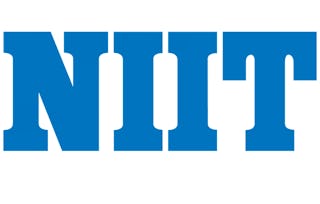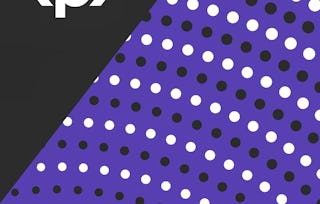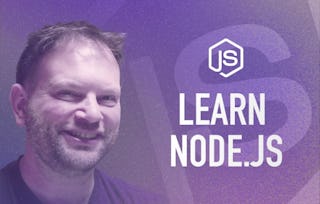Have you ever wondered how you are able to do net banking or book a ticket online? Which technology is adopted for applications used in different businesses?

Server side JavaScript with Node.js

Server side JavaScript with Node.js
This course is part of RESTful Microservices Using Node.js and Express Specialization

Instructor: NIIT
12,203 already enrolled
Included with
85 reviews
What you'll learn
Explore the Node.js environment , test and debug the basic programs incorporating Node.js techniques like modules, files and asynchronous programming
Skills you'll gain
Details to know

Add to your LinkedIn profile
7 assignments
See how employees at top companies are mastering in-demand skills

Build your subject-matter expertise
- Learn new concepts from industry experts
- Gain a foundational understanding of a subject or tool
- Develop job-relevant skills with hands-on projects
- Earn a shareable career certificate

There are 7 modules in this course
"JavaScript, a programming language is one of the core technologies of the World Wide Web. Over the years, its use has expanded beyond its web browser roots. JavaScript engines, that were originally used only in web browsers, are now considered the core components of some servers in a variety of applications. The most popular runtime system for this usage is Node.js. In this learning sprint, you will execute JavaScript programs in the Node.js environment."
What's included
16 videos2 readings1 assignment3 programming assignments
Functions in JavaScript provide modularity and reusability of code to the applications developed. They combine many instructions into a single line of code. In this learning sprint, you will learn to declare and use functions in a program.
What's included
17 videos1 reading1 assignment3 programming assignments
"Modular programming is a software design technique that emphasizes on separating the functionality of a program into independent, interchangeable modules. Each of these modules contain everything necessary to execute only one aspect of the desired functionality. This learning sprint will enable you to work with the different types of modules provided in the Node.js environment, like the inbuilt and user-defined modules. "
What's included
15 videos1 reading1 assignment2 programming assignments
Asynchronous programming is a technique that enables a program to start a potentially long-running task, and work seamlessly till it has has finished. It continues to be responsive to other events even while the task is running. Once the task is completed, the program is presented with the result. In this learning sprint, you will learn to write asynchronous programs.
What's included
20 videos1 reading1 assignment4 programming assignments
"In any programming language be it Java or C, you need to deal with several file operations, based on the business needs. To perform these operations seamlessly, Node.js provides a specific inbuilt module called the File System Module to help potential developers. A Node.js File System Module handles file operations like creating, reading, deleting and updating a file. All file system operations can have synchronous and asynchronous forms depending upon their users' requirements. In this learning sprint, you will learn how to read and write on a file both synchronously and asynchronously."
What's included
17 videos1 reading1 assignment3 programming assignments
Dealing with errors involves two very different processes; error handling and debugging. Error handling is a combination of coding and methodology that allows your program to anticipate its users and the errors. Errors, bugs, and debugging are therefore, a part of a programmer's life. This learning sprint, will enable you to handle error using exception handling mechanisms and debug a code using the inbuilt debugger tools of Chrome and VSCode.
What's included
18 videos1 reading1 assignment2 programming assignments
Testing is essential to identify mistakes. Some mistakes might be less important, while some are expensive or could be life-threatening. It is therefore crucial, to test everything that is produced because things can go wrong; humans can make mistakes at any time. Testing is important since it discovers defects/bugs before delivery to the client. It guarantees quality of both the service and software. It makes a software more reliable and easy to use. A thoroughly tested software ensures a reliable and high-performance software operation. In this learning sprint, you will learn how to test JavaScript file using Mocha and Chai testing library.
What's included
18 videos1 reading1 assignment4 programming assignments
Earn a career certificate
Add this credential to your LinkedIn profile, resume, or CV. Share it on social media and in your performance review.
Explore more from Software Development
 Status: Free Trial
Status: Free Trial Status: Free Trial
Status: Free Trial
Packt
 Status: Free Trial
Status: Free TrialScrimba
Why people choose Coursera for their career

Felipe M.

Jennifer J.

Larry W.

Chaitanya A.
Learner reviews
- 5 stars
51.76%
- 4 stars
18.82%
- 3 stars
3.52%
- 2 stars
7.05%
- 1 star
18.82%
Showing 3 of 85
Reviewed on May 20, 2023
Good enough but, the voice speed is too fast for me
Reviewed on Mar 2, 2024
The course outline is good. As for an improvement I suggest if could provide the code folder for the learn and repeat modules will be a helpful
Reviewed on Nov 5, 2023
The course is hands-on. The instructor provides a number of coding exercises that allow you to practice what you have learned.

Open new doors with Coursera Plus
Unlimited access to 10,000+ world-class courses, hands-on projects, and job-ready certificate programs - all included in your subscription
Advance your career with an online degree
Earn a degree from world-class universities - 100% online
Join over 3,400 global companies that choose Coursera for Business
Upskill your employees to excel in the digital economy
Frequently asked questions
To access the course materials, assignments and to earn a Certificate, you will need to purchase the Certificate experience when you enroll in a course. You can try a Free Trial instead, or apply for Financial Aid. The course may offer 'Full Course, No Certificate' instead. This option lets you see all course materials, submit required assessments, and get a final grade. This also means that you will not be able to purchase a Certificate experience.
When you enroll in the course, you get access to all of the courses in the Specialization, and you earn a certificate when you complete the work. Your electronic Certificate will be added to your Accomplishments page - from there, you can print your Certificate or add it to your LinkedIn profile.
Yes. In select learning programs, you can apply for financial aid or a scholarship if you can’t afford the enrollment fee. If fin aid or scholarship is available for your learning program selection, you’ll find a link to apply on the description page.
More questions
Financial aid available,

